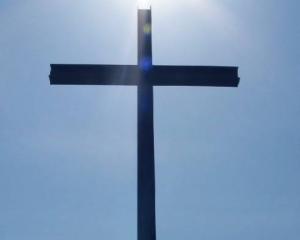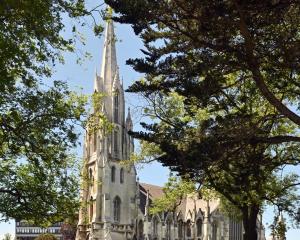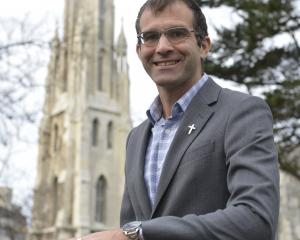What does it mean to be a priest — or to be a baptised Christian — in the modern world?, asks James Harding.
What does it mean to be a priest in the modern world?
This question has come to concern me deeply. I am ordained in the Anglican Church, and I worship in a local parish church, but while I do occasionally preach and preside at the Eucharist, I have a "secular" job - that is, a job in the world - though as it happens my work is to teach Scripture in the theology programme at Otago University, where most of my students are Christians.
To teach Scripture, and to live as a priest, sometimes seem like anachronisms in modern New Zealand. After all, is this not obviously a "secular" society, that is, a society that has left religion behind, where belief in God is a slightly strange, and occasionally dangerous eccentricity?
I am not sure the reality is quite as simple as this.
Last month, after a conference in Warsaw, a friend and I made the trip to Jasna Gora, the "bright hill" in the city of Czestochowa in Poland, which is home to a miraculous icon of the Blessed Virgin Mary. It was the Feast of the Assumption, a public holiday in Poland, and Jasna Gora was thronged with pilgrims, thousands of them, of all ages, many of whom had made the long journey to the shrine on foot.
Our journey on the intercity train from Warsaw was rather less arduous. But here, in this modern city, whose street art reminded me vividly of Dunedin, I gained a very different sense of the place of religion in people's lives, and in the life of the wider society.
Religious devotion here is an inseparable part of both private and public life. From the young father proudly bringing his son to worship at the shrine, to the old lady processing on her knees on the stone floor around the miraculous icon, crowds of people were bringing their hopes, fears, and petitions to the feet of the Queen of Poland.
And elsewhere in the city, outside the Cathedral Basilica of the Holy Family, a large sign announced, in Polish, "Chrystus czeka na ciebie" - "Christ is waiting for you." The basilica was open, of course - and by the way, I have always found locked churches mysterious, as if they intend to say that God lives here, but you are not welcome - and pious Christians were kneeling in prayer before the Blessed Sacrament.
The Catholic Church continues to play a major role in public life in Poland, and memories of the days when Karol Wojtyla was Archbishop of Krakow, and later Pope John Paul II, are everywhere.
Things have changed, of course, since the seismic political changes of 1989, but the prominence of religion in public life remains. It is by no means without its moral complexities, which are sometimes profound. Religion and national identity are closely intertwined, and faith is at times found on the front-line of the culture wars. Earlier this year, for example, a woman in Plock was arrested on suspicion of offending religious sentiment, after images of Our Lady of Czestochowa appeared in Plock with her halo painted in rainbow colours. And it remains to be seen what impact the scandal of clerical sexual abuse will have in Poland, especially in the wake of the recent documentary Tylko nie mow nikomu ("Tell No One").
As with many cities in Eastern Europe, modern Czestochowa conceals a darker recent past. A short walk from the Cathedral Basilica of the Holy Family brings you to a small patch of land with a haunting memorial to the Jewish community that was deported from here to Treblinka during the German occupation of the early 1940s. As memorials go, this one is eerily understated. A railway timetable, bearing a stamp from an office in Krakau (that is, Krakow) records that a train would leave here at precisely 12.29pm, to arrive at Treblinka with its human cargo at 5.25am the following morning. Just how many innocuous moral compromises were necessary for this enormity to be allowed to happen?
For all the differences between Poland and New Zealand, some less superficial than others, the same challenge is there. What does it mean to be a priest - indeed, to be a baptised Christian - in the modern world?
It means to bear witness to the unlikely truth that, behind the facade of modern life, God lives. This God of mercy and judgement is made known to us in word and sacrament, and is waiting for us, if we will only heed the call and turn aside. Despite the grossness of our sin, our capacity for extraordinary cruelty, and the endless moral compromises of the faithful throughout the ages - nonetheless, God lives. And nothing in earth or heaven, in the end, can separate us from the love of God in Christ Jesus.
- James Harding is a senior lecturer in the theology programme at the University of Otago.
Comments
What exactly is an "unlikely truth"? Surely you are matching Mr Harris with your wordplays? The Gospels are either unlikely and therefore not true in the minds of sceptics or they are true, factually, historically, and have great power to tell the true gospel story of Jesus Christ the true God, "begotten of the Father before all worlds, Light of Light, very God of very God, begotten, not made, being of one substance with the Father..." He is the Son of God who was born, who lived and who died, then rose from the grave physically and ascended into heaven. If we cannot say "Credo = I believe that, we have no hope of receiving the love of God even if we pray ever so hard for it!












